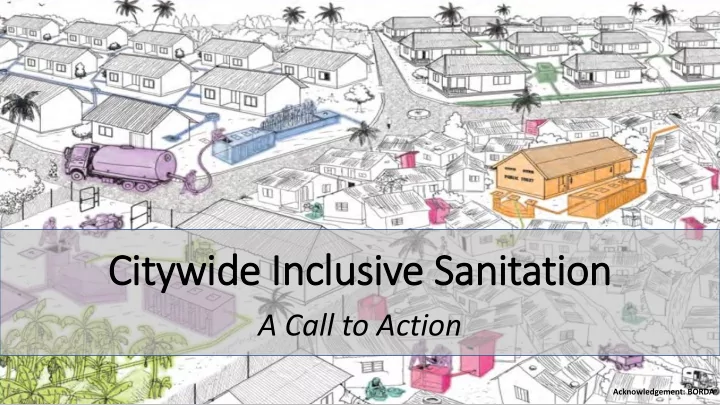

Citywide In Inclusive Sanitation A Call to Action Acknowledgement: BORDA
SDG 11: Sustainable Cities and Communities More than half of the world’s population now live in urban areas. By 2050, that figure will have risen to 6.5 billion people – two-thirds of all humanity. Sustainable development cannot be achieved without significantly transforming the way we build and manage our urban spaces . One associated goal with SDG 11: • By 2030, ensure access for all to adequate, safe and affordable housing and basic services and upgrade slums For a city to be successful, vibrant and attractive, offering an opportunity to citizens to live productive, healthy and dignified lives requires an environment free from fecal contamination. How do we make sure sanitation service provision is incorporated in ongoing city actions?
Citywide Inclusive Sanitation: A Global Coalition • Six global organizations started thinking and talking about inclusive sanitation for cities in 2016. • What does “inclusive sanitation” look like? • Who should be involved, especially from outside the WaSH sector? • What do we know and don’t we know? • The Citywide Inclusive Sanitation (CWIS) Call to Action (CtA) resulted, subsequently endorsed or supported by 30+ other organizations and individuals.
Timeline Overview The Atlanta workshop results suggested a growing group of stakeholders, gathering momentum over time, building on a consensus around who should be involved and what the result would be for cities We are here Conception Call to Action Growing the Finalize Agree Ideas Carry On Coalition Structure Plan 1, Partner 1 Plan 2, Publication 2016 Partner 2 Atlanta of CWIS workshop. CtA 4-pager Plan 3, Partner 3 Etc. • • June 2016, Emory Defining Citywide • • Sharing with more Collect feedback University Inclusive Sanitation • organizations Publish reviewed • • WaSH and urban Describing the • Inviting Foundational development myths to be busted • • engagement Paper Global and country- Implementation of • partners share Agreeing on key • • level activities, Finding the non- Organizational ideas, supported supported by experiences principles of action WaSH partners Clarity by partners partners 4
A Vision for Healthy Cities • Our vision is for cities where… …all citizens live productive, healthy, dignified lives in an environment free from fecal contamination …human waste is managed to safeguard the urban environment, including water and food supplies • A vision which is increasingly under threat as cities struggle to cope with… …limited financial and human resources …rapid, unplanned urbanization …a changing climate 5
Removing Roadblocks: Addressing Myths Click Here:
Business As Usual isn’t Working • We need a shift in mindsets and practices to transform cities into clean, livable and productive places. This will require: • Political leadership and accountability, for • engaging all stakeholders, to • drive a coherent citywide strategy that delivers sanitation for all as a human right How to empower city executives to practice business unusual? 8
Engaging All Stakeholders Urban development professionals to better coordinate mandates (sanitation, land use planning, housing, drainage, solid waste…) Sanitation professionals to blend both conventional and new solutions in innovative ways consider both reticulated and onsite approaches take account of the needs and resources of customers, including the poor link sanitation solutions to broader urban development priorities 9
But Recognize Complexity • Driving collaboration among groups of different actors is not trivial; • Each city is organized in its own unique way; there is no “one size fits all” • Political leadership or city institutions may be lacking or weak. We call on all actors to work on the basis of four inter-locking 4 principles: 10
• Join the conversation #InclusiveSanitation 11
A long term vision for the initiative: Recommendations from the “Achieving Universal Access to Urban Sanitation Services” Workshop at Emory University, Atlanta June 2016 • Connect with other urban services and development initiatives, associations, and coalitions • Work with existing WASH fora and partnerships to promote City-Wide Inclusive Sanitation (CWIS) • Set up a Global Challenge Fund for CWIS • Develop Global Support Facility for CWIS projects with compendium of relevant knowledge products, tools, and resources • Create Community of Practice for advocacy and research • Develop global initiative for training and capacity building in CWIS design and implementation • Initiate global benchmarking on status of CWIS using meaningful indicators
What Next? – Some suggestions for foundational activities: Coalition Structure Foundational Paper Use of Tools Working group proposes how the Provide input and feedback on Build on existing work to Coalition is organized and peer-reviewed white paper setting understand and respond to need administered- including outreach, out CWIS priorities through 2030. for tools. Share solutions and best broadening participation, contact White paper to contribute to practices around dissemination, point, communication, activity stakeholder agendas in SDG period user training and – feedback, case planning, etc. development. Feb 1 2018: Options proposed June 2018: Paper published WWW 2018: Review of progress Jun 1 2018: Decision made against tool agendas
What do you see as your role in this? • Contribute to ongoing activities within the specified time frames • Propose additional actions that could be taken on by the CWIS Coalition • Promoting and driving CWIS for specific cities • Knowledge exchange • Commit to specific actions that support or promote CWIS as organization or individual • Email: citywideinclusivesanitation@gmail.com
Questions? Questions?
SLIDES OLIVIA ARMENTA & MAARTEN GISSCHLER
Given what you have heard, and thinking about your own circumstances, what kind of role could a global effort play to unlock the potential for CWIS to help deliver against SDG 11?
Recommend
More recommend